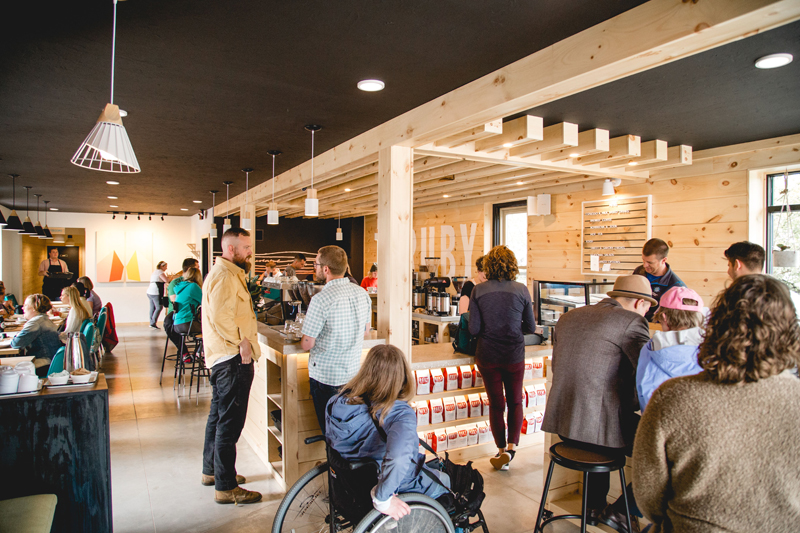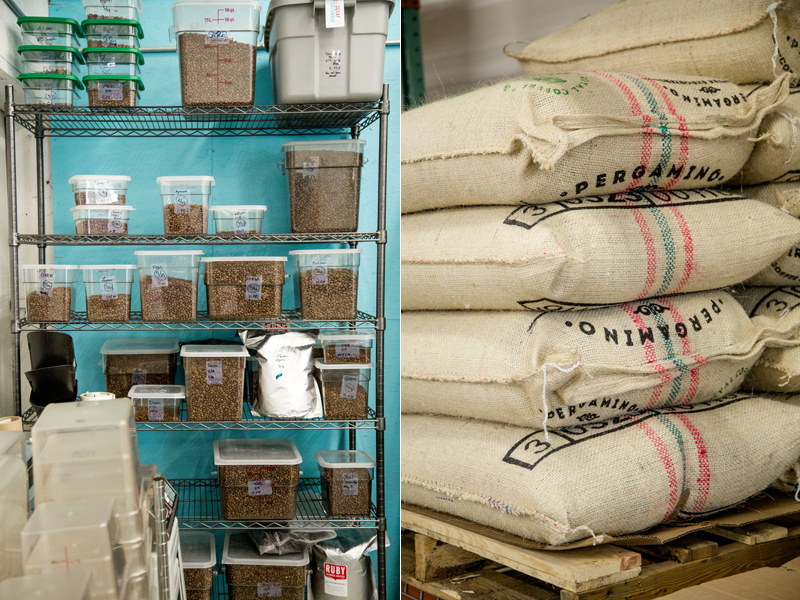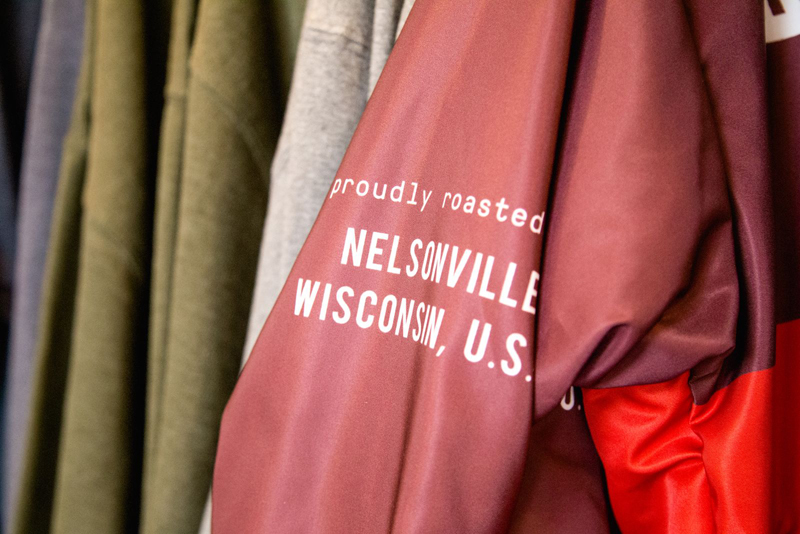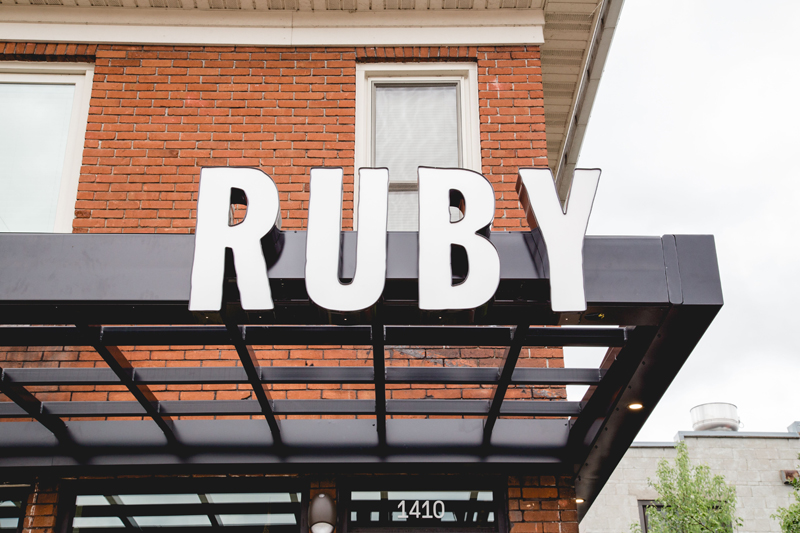PHOTOS COURTESY OF RUBY COFFEE ROASTERS
This story is reprinted from the November 27, 2020 edition of the Heavy Table Tap newsletter.
The week before Thanksgiving 2019, I drove 110 miles out of my way for a cup of coffee. It was a bright, clear morning, so my husband and I ditched our Eau Claire Airbnb and headed east to Ruby Cafe in Stevens Point, Wis. We ordered drinks, sat by a window, and walked out with arms full of coffee and merch. Then we got back on the interstate and headed west.
I don’t usually spend five hours on a coffee run, but I’d long been curious about Ruby Coffee Roasters. They’re based in Nelsonville, Wis. (population: 154). They ship coffee all around the United States, and they’ve become one of the best-known specialty roasters in the Upper Midwest.
Jared and Deanna Linzmeier founded Ruby Coffee Roasters in late 2013. They had lived in L.A., Portland, and Seattle before setting up shop in Jared’s family home’s garage in Portage County, Wis. Since then, they’ve moved to Nelsonville and grown from zero employees to about 20 full-timers, plus the part-time folks helping in production or working at the cafe. They’ve built partnerships with farms in Ethiopia, Guatemala, and El Salvador, and they supply cafes all over the U.S., from New York City to Seattle to Miami.
One of Ruby’s longstanding wholesale accounts is with Angry Catfish and Northern Coffeeworks, the Minneapolis coffee/bike sister businesses owned by founder Josh Klauck and investor Jeff Hilligoss. Yuval Avrum managed Angry Catfish from 2016-2019, and she says the cafe’s original plan was to serve coffee from Intelligentsia and a rotating roaster. “But what ended up happening,” she says, “is Ruby was just so good and so consistent that they were like, ‘Let’s just have Ruby be a staple of the shop.’”
Angry Catfish is a specialty cafe, which means they meet one particular requirement, according to Avrum. “Coffee gets graded on a scale of up to 100, and if a shop is serving 80 or above, they’re specialty,” she says. “You don’t need a fancy machine; you don’t need to do pour-overs; you don’t need to weigh anything out. Are you serving nice coffee? Ok, great. You’re a specialty shop.” She says the average of what Angry Catfish would serve is 84 and above, which is about where Ruby’s coffees land.
 On the spectrum of light to dark roasts, Ruby sits “pretty squarely in what I think of as a medium-roast,” Linzmeier says. His roasts are harmonious and smooth. On the typical Ruby flavor balance, Avrum says, “When a flavor note does come through, it comes through really strong. And then as it sits, it disperses into something else, whether it’s fig or apple, or maybe kind of lemony. It keeps changing, and it changes as the coffee cools. Their coffee is very nuanced, and often accessible.”
On the spectrum of light to dark roasts, Ruby sits “pretty squarely in what I think of as a medium-roast,” Linzmeier says. His roasts are harmonious and smooth. On the typical Ruby flavor balance, Avrum says, “When a flavor note does come through, it comes through really strong. And then as it sits, it disperses into something else, whether it’s fig or apple, or maybe kind of lemony. It keeps changing, and it changes as the coffee cools. Their coffee is very nuanced, and often accessible.”
As for Ruby’s Angry Catfish compatriot, Intelligentsia is such a specialty coffee behemoth that all newer roasters must stack up against their wares. Linzmeier used to roast coffee for Intelligentsia, and in general, he notes, “Acidity is generally rewarded by professional tasters more than sweetness.” He says there’s some justification for that: “Coffees have to be picked really ripe and cared for really well to reach that level of acidity.” But acidity is correlated to light roasting, and sometimes, Intelligentsia’s can be a bit much. Avrum says, “Sometimes [Intelligentsia] is just a tiny bit too light. And you need to brew it for forever to actually get everything out of it. [Whereas] you get Ruby, you do a pourover – it’s three minutes, barely – and it’s just like, phenomenal.”
It’s probably worth mentioning that the default modality among high-end coffee drinkers is black, although Linzmeier says he doesn’t mind if folks doctor up his product. It’s all about accessibility, he says: “If you have a Mr. Coffee and a blade grinder and that’s where you’re at, then our coffees should taste good on that set-up […] This is something you can drink at home.” For the record, Ruby is one of the few roasters whose product I’ve never wanted to boost with cream or sugar – the coffee is usually sweet and rich on its own. Their Ethiopia Yukro beans currently stock my grinder at home.
A note on accessibility, though: Averaging $19 for one 12-ounce bag, Ruby’s prices are higher than some might ever imagine paying for coffee. The lowest price on their site is currently $15 for 12 ounces of their flagship Creamery blend, and the highest is $25 for rare Gesha beans. But Linzmeier believes his product is worth the cost. He says, “We could figure out a way to sell coffee at eight dollars a pound, but we’d have to buy cheaper coffee, which doesn’t really appeal to me. There’s enough people doing that. And I’ve spent enough time visiting coffee farms in different parts of the world to feel really not comfortable pushing the low end of coffee pricing. It’s not sustainable in any way.”
 FROM GUATEMALA TO WISCONSIN
FROM GUATEMALA TO WISCONSIN
Ashley Prentice, a third-generation Guatemalan coffee producer, shares that mindset. Her family’s farm, Finca de Dios, is a “boutique farm” with about 50 acres of coffee plants. Since they don’t process a huge quantity of coffee, they focus on the quality of their plants – which is very, very good. Finca de Dios placed 13th among all Guatemalan coffee farmers in the 2008 Cup of Excellence competition.
Like Ruby, Finca de Dios has found a niche in specialty coffee: beans awarded more than 80 points by licensed Q graders. Coffees that may not score so high get shuffled into the commodities market, which is based on supply, demand, and trader predictions thereof. The problem is, if coffee-producing juggernauts such as Brazil or Vietnam flood the market, the value of Guatemalan commercial coffee suffers. And Prentice says the commodities market fails to account for quality. Guatemala’s terrain requires that workers hand-pick coffee cherries, Prentice says, but “Brazil has huge, huge farms, and they have machines that pick the coffee.” The machines can’t tell the difference between ripe and unripe coffee, so they just harvest it all at once, which can result in a bitter cup.
In Guatemala, the commodities market has made coffee farming less and less attractive, according to Prentice. She says, “Commercial prices are usually very low, often below cost of production. And every year, you see more farmers leave farming. But we focus on producing specialty coffees – which is what Ruby serves – where we don’t even have to look at the C Market price.”
 Linzmeier first visited Finca de Dios in 2012, traveling through Central America with some roaster friends. Once he and his wife founded Ruby, he got back in touch, and Ruby has bought coffee from Finca de Dios for six years running.
Linzmeier first visited Finca de Dios in 2012, traveling through Central America with some roaster friends. Once he and his wife founded Ruby, he got back in touch, and Ruby has bought coffee from Finca de Dios for six years running.
In any given year, some Finca de Dios lots will be exceptional, and some will be more standard. To stay profitable, the Prentice family has to sell all of its coffee within a certain timeframe, before it starts losing flavor. So as a businessperson, Linzmeier feels a responsibility to buy beans of various qualities – “to not just cherry-pick, so to speak, these top lots and ignore the rest.” That mission has resulted in the Tomorrow Seasonal Project, which Ruby says will allow them to buy more coffee from their partners at a “premium specialty” price.
SURVIVING A PANDEMIC
Angry Catfish has closed the cafe portion of their shop, focusing on bikes throughout COVID-19, but Ruby’s cafe in Stevens Point remains open for take-out only. It can be extra profitable for a roaster to open a coffee shop; when you’re essentially getting beans at cost, there’s more money to be found in cafe sales. But given that Ruby Cafe had only been open since May 2019, and that the Linzmeiers had bought and fixed up the building, it hasn’t exactly been a gold mine. “Money aside,” Linzmeier says, “when you take that [community space] away, it’s just emotional.”
 The good news is that Ruby has shipped more coffee to individual consumers this year than ever. They offer a precious indulgence in an austere era – and they fill the needs of white-collar workers who’ve been brewing their own coffee while headquartered at home. Plus, Ruby launched new subscriptions in February, and Linzmeier reports a “significant growth” in that area.
The good news is that Ruby has shipped more coffee to individual consumers this year than ever. They offer a precious indulgence in an austere era – and they fill the needs of white-collar workers who’ve been brewing their own coffee while headquartered at home. Plus, Ruby launched new subscriptions in February, and Linzmeier reports a “significant growth” in that area.
Moving forward, Linzmeier is glad that sales have stayed strong enough that Ruby can keep buying coffee from producers at the same rate as they did in 2019. Ashley Prentice also feels proud of her work, thanks in part to Ruby. “What made me want to actually stay [in Guatemala] and love coffee so much,” she says, “has been seeing the appreciation and the value that the roasters have for our coffee. We do have a special product.” She continues, “Before, coffee used to be sold by region, or maybe by country, if it’s a commercial thing. But I feel like companies like Ruby are really committed to telling that story, which makes you feel like, ‘Wow, they care enough to tell it, so it must be worth something, doing what we’re doing down here.’ […] We feel so fortunate that we have buying partners that appreciate our coffees like they do.”

